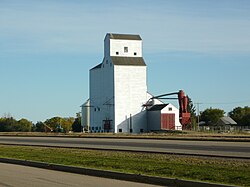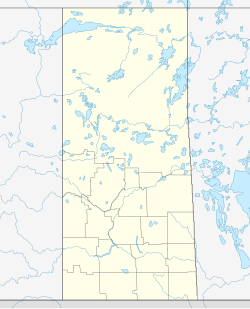Borden (2021 population: 312) is a village in the Canadian province of Saskatchewan within the Rural Municipality of Great Bend No. 405 and Census Division No. 16. Borden is named after Sir Frederick William Borden, Minister of Militia in the Laurier Cabinet.[5] An abandoned arch bridge with the same name (Borden Bridge) is located to the southeast and was once used to carry Highway 16 across the North Saskatchewan River.
Borden | |
|---|---|
| Village of Borden | |
 Grain elevator in Borden. | |
| Coordinates: 52°24′47″N 107°13′19″W / 52.413°N 107.222°W | |
| Country | Canada |
| Province | Saskatchewan |
| Region | Saskatchewan |
| Census division | 16 |
| Rural Municipality | Great Bend |
| Post office Founded | 1905 |
| Incorporated (Village) | 1907 |
| Fire Dept. | 1941 |
| Government | |
| • Type | Municipal |
| • Governing body | Borden Village Council |
| • Mayor | Jamie Brandrick |
| • Administrator | Carly Hess |
| Area | |
• Total | 0.76 km2 (0.29 sq mi) |
| Population (2021) | |
• Total | 312 |
| • Density | 378.5/km2 (980/sq mi) |
| Time zone | UTC-6 (CST) |
| Postal code | S0K 0N0 |
| Area code | 306 |
| Highways | Highway 685 |
| Railways | Canadian National Railway |
| Website | Village of Borden |
| [1][2][3][4] | |
History
editBorden incorporated as a village on July 19, 1907.[6]
Demographics
editIn the 2021 Census of Population conducted by Statistics Canada, Borden had a population of 312 living in 120 of its 131 total private dwellings, a change of -2.1% from its 2016 population of 287. With a land area of 0.73 km2 (0.28 sq mi), it had a population density of 384.9/km2 (997.0/sq mi) in 2021.[9]
In the 2016 Census of Population, the Village of Borden recorded a population of 287 living in 126 of its 140 total private dwellings, a 14.6% change from its 2011 population of 245. With a land area of 0.76 km2 (0.29 sq mi), it had a population density of 377.6/km2 (978.1/sq mi) in 2016.[10]
Notable people
edit- David Buckingham, politician.
- Savannah Sutherland, is a 400 m Olympic hurdler.
See also
editReferences
edit- ^ National Archives, Archivia Net, Post Offices and Postmasters, archived from the original on 2006-10-06
- ^ Government of Saskatchewan, MRD Home, Municipal Directory System, archived from the original on November 21, 2008
- ^ Canadian Textiles Institute. (2005), CTI Determine your provincial constituency, archived from the original on 2007-09-11
- ^ Commissioner of Canada Elections, Chief Electoral Officer of Canada (2005), Elections Canada On-line, archived from the original on 2007-04-21
- ^ "Geographic Names of Saskatchewan", Bill Barry (2005), p 53.
- ^ "Urban Municipality Incorporations". Saskatchewan Ministry of Government Relations. Archived from the original on October 15, 2014. Retrieved June 1, 2020.
- ^ "Saskatchewan Census Population" (PDF). Saskatchewan Bureau of Statistics. Archived from the original (PDF) on September 24, 2015. Retrieved May 31, 2020.
- ^ "Saskatchewan Census Population". Saskatchewan Bureau of Statistics. Retrieved May 31, 2020.
- ^ "Population and dwelling counts: Canada, provinces and territories, census divisions and census subdivisions (municipalities), Saskatchewan". Statistics Canada. February 9, 2022. Retrieved April 1, 2022.
- ^ "Population and dwelling counts, for Canada, provinces and territories, and census subdivisions (municipalities), 2016 and 2011 censuses – 100% data (Saskatchewan)". Statistics Canada. February 8, 2017. Retrieved May 30, 2020.

